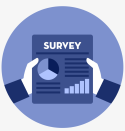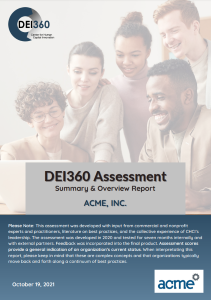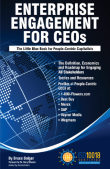Take This Quick Survey for a Snapshot of DEI in the Workplace
A new stakeholder survey created by the Center for Human Capital Innovation known as DEI360 is built to help organizations establish a baseline for the effectiveness of Diversity, Equity, and Inclusion processes. The Enterprise Engagement Alliance is using it as part of an anonymous three-week survey to measure the perceived level of DEI in business, ending Feb. 28, 2022.
This brief anonymous organizational Diversity, Equity, and Inclusion survey collects responses from ESM readers' perspectives to obtain anonymous, quantitative insights into the way survey respondents feel and experience Diversity, Equity, and Inclusion (DEI) in their organizations. The results of this survey will aggregate the results of individuals from multiple companies collected over a three-week period to provide an informal survey of how people feel about DEI within their own organizations.
 Click here to take the anonymous survey by Feb. 28, 2022. The results will be shared with ESM readers shortly thereafter. This assessment is confidential and should take less than 15 minutes to complete. Answers will not be linked to respondents in any way.
Click here to take the anonymous survey by Feb. 28, 2022. The results will be shared with ESM readers shortly thereafter. This assessment is confidential and should take less than 15 minutes to complete. Answers will not be linked to respondents in any way.
The DEI360 survey is designed to help organizations effectively map their Diversity, Equity, and Inclusion strategies by establishing a clear baseline using feedback from employees, teams, boards and all the different stakeholders compared with factual data. It is available for use by any organization seeking to benchmark and track perceptions about DEI within its own culture.
 According to Anne Loehr, Executive Vice President of the Center for Human Capital Innovation, the DEI assessment was developed with input from commercial and nonprofit experts and practitioners, literature on best practices, and the collective experience of CHCI’s leadership. The DEI360 assessment captures both qualitative and quantitative data, starting with the perceptions of all stakeholders, she explains. The quantitative data uses the Likert scale and qualitative data that captures the perspectives of the respondents. This information can then be compared with the company’s analysis of human resources and other existing data, including workforce demographics, hiring, compensation, and turnover data, succession planning and learning data, and employee complaints, etc. to reveal gaps between perceptions and reality. For example, a workforce may be diverse and equitable statistically, but perceived to be otherwise, Loehr points out.
According to Anne Loehr, Executive Vice President of the Center for Human Capital Innovation, the DEI assessment was developed with input from commercial and nonprofit experts and practitioners, literature on best practices, and the collective experience of CHCI’s leadership. The DEI360 assessment captures both qualitative and quantitative data, starting with the perceptions of all stakeholders, she explains. The quantitative data uses the Likert scale and qualitative data that captures the perspectives of the respondents. This information can then be compared with the company’s analysis of human resources and other existing data, including workforce demographics, hiring, compensation, and turnover data, succession planning and learning data, and employee complaints, etc. to reveal gaps between perceptions and reality. For example, a workforce may be diverse and equitable statistically, but perceived to be otherwise, Loehr points out.
The assessment was developed in 2020 and tested for seven months internally and with external partners, she says, to effectively measure stakeholder perceptions versus the facts and to identify gaps and potential solutions.

An organization’s DEI360 results can be analyzed against past audits and with other data such as employee engagement surveys and performance data, Loehr says. While CHCI emphasizes anonymity in the DEI360 survey, correlations between results and trends in employee engagement, learning, performance, and retention are expected to be closely correlated, she points out. Trend analysis of the DEI360 over time, including against other survey and HR data, for example, can demonstrate the survey’s convergent and predictive validity.
Click here for a sample report.
“By working with our clients to capture sufficiently large and representative samples of the organization in DEI360 assessments, and in combining existing workforce data with DEI360 data and qualitative interviews, our clients enjoy high confidence in the accuracy of our insights and are confident that the steps taken to improve DEI are the right ones,” Loehr says. The program, led by experts in DEI, takes about four weeks to complete, and includes a professional analysis, a report, and actionable recommendations.
For More Information
Bruce Bolger
Founder, The Engagement Agency
914-591-7600
Master the “S” of Environmental, Social, Governance (ESG), A.k.a. Stakeholder Capitalism
The Enterprise Engagement Alliance at TheEEA.org is the world’s first and only organization that focuses on outreach, certification and training, and advisory services to help organizations achieve their goals by fostering the proactive involvement of all stakeholders. This includes customers, employees, distribution and supply chain partners, and communities, or anyone connected to an organization’s success.
Training and Thought Leadership
- Founded in 2008, the Enterprise Engagement Alliance provides outreach, learning and certification in Enterprise Engagement, an implementation process for the “S” or Social of Stakeholder Capitalism and Human Capital Management and measurement of engagement across the organization.
- The Enterprise Engagement Alliance provides a training and certification program for business leaders, practitioners, and solution providers, as well as executive briefings and human capital gap analyses for senior leaders.
- The EEA produces an education program for CFOs for the CFO.University training program on Human Capital Management.
- Join the EEA to become a leader in the implementation of the “S” of ESG and Stakeholder Capitalism.
- The ESM information portal and The Enterprise Engagement Advisors Network solution provider marketplace cover all aspects of stakeholder engagement, and the EEA information library lists dozens of resources.
- The RRN information portal and Brand Media Coalition marketplace address the use of brands for gifting, incentives, recognition, and promotions. The BMC information library provides information and research resources.
Video Learning
The EEA Human Capital Management and ROI of Engagement YouTube channel features a growing library of 30- to 60-minute panel discussions with leading experts in all areas of engagement and total rewards.
- Enterprise Engagement for CEOs: The Little Blue Book for People-Centric Capitalists. A quick guide for CEOs.
- Enterprise Engagement: The Roadmap 5th Edition implementation guide. A comprehensive textbook for practitioners, academics, and students.
Enterprise Engagement Advisory Services
The Engagement Agency helps:
- Organizations of all types develop strategic Stakeholder Capitalism and Enterprise Engagement processes and human capital management and reporting strategies; conduct human capital gap analyses; design and implement strategic human capital management and reporting plans that address DEI (Diversity, Equity, and Inclusion), and assist with managed outsourcing of engagement products and services.
- Human resources, sales and marketing solution providers profit from the emerging discipline of human capital management and ROI of engagement through training and marketing services.
- Investors make sense of human capital reporting by public companies.
- Buyers and sellers of companies in the engagement space or business owners or buyers who seek to account for human capital in their mergers and acquistions.
For more information: Contact Bruce Bolger at Bolger@TheICEE.org or call 914-591-7600, ext. 230.
















